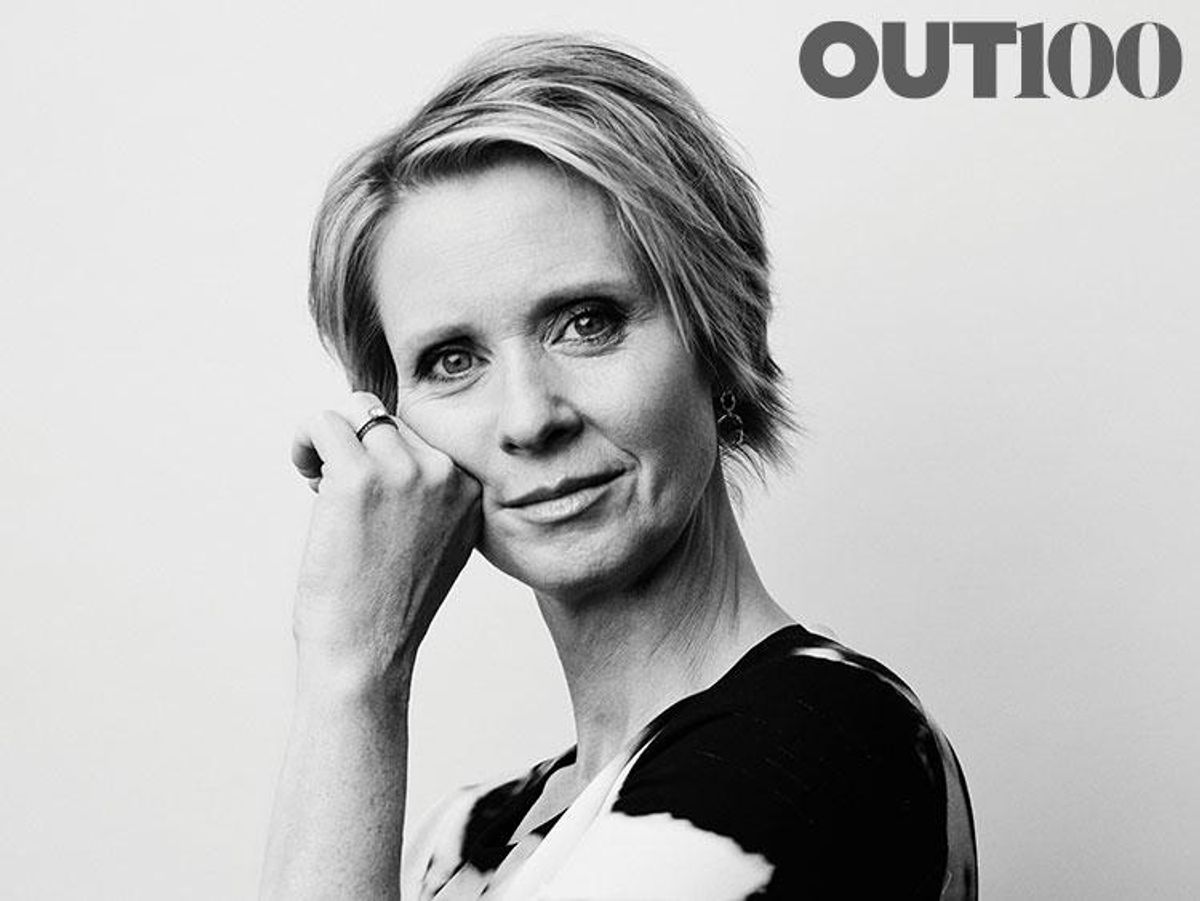Featuring plenty of witty zingers and musical theater and pop culture references, Steveis about a failed Broadway chorus boy turned stay-at-home dad named Steven (Matt McGrath), who finds himself mired in uncertainty and fear. His partner of 16 years, Stephen (Malcolm Gets), has been sexting a mutual friend's man (none of the men happen to be legally married), and his lesbian best friend (Ashlie Atkinson) has been diagnosed with terminal cancer. Helming the poignant comedy, produced by The New Group, is Cynthia Nixon, who made her theater directorial debut with last season's lauded production of Rasheeda Speaking.
RELATED | Out100: Cynthia Nixon
"I grew up totally steeped in musical comedy culture, the same way these people seemingly have," says Nixon of what drew her to the play. "I relate to that on such a visceral level when you are trying to make a point about the emotional situation in which you find yourself and the first thing that comes to mind is a Sondheim song lyric or a Sondheim situation." Like many of us who are obsessed with musical theater, the text of the lives of these characters are musicals. More importantly, in this world, the works of Sondheim are "holy scripture," says Nixon. "And it lives in them."
Coupled with how fun Steve is for the cast, crew, and audiences, it is a show filled with smartly crafted and keenly delivered social commentary. "It's a play about the love/hate relationship we have with assimilation," says Nixon. "You fight like hell to get invited to the party. But then, once you are invited to the party you have to think, 'Well, actually, it would not be okay if I wasn't invited to the party. So, thank you for inviting me...finally. However, I'm not sure I really want to go to your party.'"
For a majority of the characters in the play, that party is the world of marriage equality. Yet, Steve is not your simplistic, run-of-the-mill living room farce. Gerrard complicates the pertinent issues in his work by having a couple who appears to desire to revel in their domestic bliss of husband, husband, and child. Yet, the other prominent couple in the play, played to perfection by real life couple Jerry Dixon and Mario Cantone, is exploring the benefits and costs of a seemingly open marriage that may or may not involve them in a thruple with their personal trainer. Most importantly, the play does not dictate to the audience that either couple is right or wrong.

From Left: Malcolm Gets, Jerry Dixon, Mario Cantone, Matt McGrath
"Instead, you have different couples and individuals--all of whom are LGBT--that are sort of doing their best to carve out their own path and trying to tailor-make something that's off-the-rack, trying to alter it so that it feels right on them and they feel right wearing it," says Nixon. "I think the important thing to note is that no one is totally thrilled when they look in the mirror. There is no one in the play who is like, 'Yes! I found my suit of clothes!'"
Also, Gerrard tackles the loss of identity that comes with acceptance and equality in Steve. "It's like you've been beating down those doors and are very grateful for the opportunities, and rights, and privileges, and economic opportunities that comes with that," says Nixon, "but the thing that they perhaps didn't really realize was going to come with that is loss of community and a loss of identity." This is definitely one of the driving forces--even if it is subconscious--behind failed chorus boy Steven's fears. Does the identity that comes with the married bliss of monogamy erase the previous identity of switching partners as one pleases or even exploring the world of threesomes? Can those identities co-exist both inside and outside of a committed relationship? These are a few of the questions facing the characters in Steve, and the ones the play asks the audience to consider as well.
"Everybody should be allowed, and should be encouraged, to tailor-make their own relationships for themselves and not just do something because they think that is what a marriage is supposed to be," Nixon explains. "They should find what works for them, and just know that just because people allow you to say 'I do' doesn't mean that everything is now all set for life."
Even with the heavier thematic elements, at its heart Steve is an effervescing comedy that sends audiences home with smiles on their faces. "It's a Valentine with pain," says Nixon. "It's not a fake Valentine. A hard-earned Valentine maybe, but I think it's a Valentine." Like any well-written comedy, Gerrard's Steve encourages the audience to evaluate their own self while letting them laugh at representations of scenarios similar to their own. At its heart, the play definitely shows us how, despite being hard, wonderful long-term relationships can be.
Steve opens Nov. 18 and continues through Dec. 27 at the Pershing Square Signature Center, NYC.
























































































